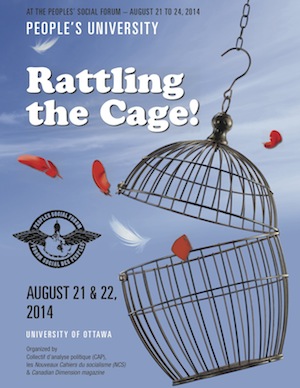For decades, intellectuals have asked themselves what they could do best to participate in the process of transformation. In the earlier stage of the socialist movement, the paradox was that on the one hand, the working class was to lead that process, and on the other hand, it was unable, on its own, to develop the “scientific” theory required to push the struggle forward. In the fissures of that tension, leading intellectuals became the de facto leaders of the mass socialist parties of the early 1900s.
Later, as time went by, it became apparent that socialism was not exactly a “science” that was waiting to unfold. New generations of activists surged ahead in mass parties and movements, sometimes pushing out traditional intellectuals, as happened in Russia, Germany and other countries. Gramsci, Carlos Mariategui and Rosa Luxembourg were amongst those who explained that it was necessary to distinguish “intellectuals” in the widest sense of the word and “academics” or “scholars,” and that “people’s intellectuals” were emerging from mass struggles.
Yet for many, Marxism was still an uncontested set of theories that needed to be learned and applied. When that “science” contradicted reality, there was a clash. It happened in colonies and semi-colonies of what was not yet the “global south.” Marxism was transformed, along with it socialism, intellectuals and political action. There was, in popular revolutions like in China, the idea that the struggling masses were the creators of history, therefore of theory, and that in the contradiction between theory and practice, it was the second moment (practice) that was the base. It allowed socialism to expand more freely in a phase where massive national liberation movements expanded in the global south and inspired by Cabral, Fanon, Mao and may others.
In the complex and prolonged May 1968 revolution, as Immanuel Wallerstein explains, the production of new knowledge exploded all over through new generations of activists and movements. The expansion of post-secondary education gave more space to popular sectors, including those who had been traditionally left out, like women, indigenous, sexual minorities, migrants. This was captured by thinkers like Pierre Bourdieu, CLR James, Raya Dunayevskaya and countless others who proposed new methodologies and approaches, outside of the dusty and stifling academic paradigm. The invisible became visible and the silent became talkative, resisting, struggling, searching, facing off the new wave of patriarchal capitalism and imperialism as we know it today. In that drive, the impetus was the production of new knowledge, for and by popular movements, “decolonizing” the mindset and exploring the accumulated sciences of struggles, as Enrique Dusserl, Hilary Wainwright and Alvaro Linera Garcia, amongst others, have explained.
Today as never before, our world is being contested by powerful movements who deepen their criticism of “really existing capitalism,” away from past illusions, and towards building the new avenues of transformation where our pitch is much wider, encompassing “pachamama,” “swaraj,” “buen vivir,” Ubuntu and ecosocialism.
Yes comrades, it is still early, contradictory and painful, along the side of many revolutionary processes materialized through Indignados, Occupy, various “Arab and maple springs,” mass protests in Athens, Sao Paolo, Istanbul, Santiago, Bangkok, Durban, Tunis, Montreal, Mexico, Madrid, Los Angeles and other contested areas of a growingly chaotic universe. Millions are on the march, worldwide …
This is the context that explains why NCS and Canadian Dimension, with a host of people’s movements across the land, are organizing a wide platform of discussions that will occur during the People’s Social Forum. It is an appropriate platform where thousands of people from so many sectors are coming with lots of ideas on how to resist, build and even, with a touch of idealism, win!
It will probably be only the beginning …
See details about how to be part of the People’s University here.



